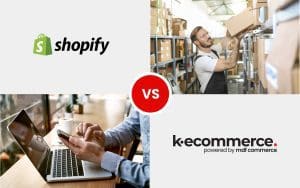
BigCommerce vs. k-ecommerce: A comparison

Marketing Team
k-ecommerce
In today’s B2B market, most store owners are increasingly focused on expanding online sales. According to SAP, 50% of B2B sellers are prioritizing ecommerce platform investments, making the online B2B market more competitive.
If you’re also planning to start or scale your B2B website, choosing the right ecommerce platform is important to stay ahead in the race.
When you’re looking for the best ecommerce platforms, you might come across popular options like BigCommerce and k-ecommerce.
Both platforms power many ecommerce websites on the internet. However, their features differ, and matching features to your needs is crucial when choosing an ecommerce tool.
We compare the two platforms in-depth and answer all your questions in the BigCommerce vs. k-ecommerce debate so you can choose the right platform for you.
Here’s what you’ll learn:
- What Does k-ecommerce Do?
- What Does BigCommerce Do?
- BigCommerce vs. k-ecommerce: Comparing the Two Platforms
- Final Thoughts: k-ecommerce vs. BigCommerce: Which Is the Best B2B Ecommerce Solution?
What Does k-ecommerce Do?
k-ecommerce offers ERP-integrated solutions to simplify online sales and payments.
They offer all-in-one turnkey solutions through which you can receive orders, maintain inventory, and connect with payment gateways.
k-ecommerce offers two solutions:
- K.ecom: A complete ecommerce solution that lets you set up and scale your business by automating business processes, integrating with major ERP like Acumatica, Microsoft, and SAP.
- KIP: A payment solution that streamlines transactions and automates synchronization between Microsoft D365 BC or Dynamics GP and KIP, reducing errors and expediting the process while enabling secure payments anytime and anywhere through a client portal.
These products have features for B2B, B2C, and D2C. Plus, the platform is secure for all business processes, uses SSL certificates, and helps with PCI Level 1 compliance.
What Does BigCommerce Do?
BigCommerce is a standard SaaS solution that helps you sell online by simplifying store creation, shopping cart management, social media and Amazon integrations, and customer experience.
The platform offers ecommerce solutions through multiple product variants suitable for selling via omnichannel and drop shipping.
BigCommerce vs. k-ecommerce: Comparing the Two Platforms
BigCommerce and k-ecommerce are both popular ecommerce platforms, but they approach functionality in different ways and focus on different use cases.
1. ERP Integrations
An ERP-integrated platform ties together many business processes, such as customer service, workflow management, and inventory management. When investing in additional ecommerce products, they should integrate with your existing ERP to help you manage all processes through a single platform, saving costs, resources, and time.
BigCommerce
BigCommerce offers standalone products that work separately from your ERP. You can use these solutions independently, but that means sacrificing ease of use as you need to work on different platforms for different tasks, which is a hassle.
If you want to integrate the BigCommerce standard products into a single platform, you’ll need to use ERP connectors or APIs from third-party service providers, and that leads to extra costs in addition to the BigCommerce pricing.
This also means that your ecommerce technology is handled by multiple companies instead of just one.
BigCommerce also doesn’t offer many options in terms of field diversity. If you want to use their products in fields that aren’t readily available, you’ll have to create and maintain the required fields, incurring additional costs and usage of resources.
k-ecommerce
k-ecommerce provides solutions that are ready for ERP integrations and natively work with most platforms like Acumatica, Microsoft, and SAP Business One. This makes the solution user-friendly and saves the cost of using additional connectors or working with another provider.
The products also synchronize data with your ERP’s backend, keeping your ERP and storefront independent. Plus, all your ecommerce technology data is safe with a single service provider.
k-ecommerce also offers over 150 mapped fields between the ERP and K.ecom, with regular updates for each new ERP version. In contrast, competing solutions can’t compete in terms of field diversity. If the fields the customer needs are not available in competitor software, users would have had to bear the costs of creating and maintaining those fields, resulting in additional expenses.
2. B2B Functionality
B2B organizations operate differently from B2C and D2C businesses. For example, B2B business owners might have custom pricing and need more self-service usability options for each client.
BigCommerce
The BigCommerce app is a one-size-tries-to-fit-all general solution. Its online store features can technically be applied to any use case, but this means there are no dedicated online business features offered for things like large orders, which is usually the case in B2B businesses.
If you want to add B2B features to BigCommerce stores, you’ll again need to deal with multiple third-party providers and additional costs.
k-ecommerce
k-ecommerce is predominantly dedicated to B2B and has many B2B features, such as secure catalogs, special pricing, and payment options suitable for larger orders in k.ecom. You don’t need additional plugins or third-party add-ons to enable them.
But these advanced features are also applicable for B2C and D2C online business’s ecommerce stores. This makes k-ecommerce an excellent solution for both enterprise-level and small businesses.
3. Partnerships
If you’re looking for a long-term ecommerce solution, having a service partner to support your business is essential. While both BigCommerce plans and k-ecommerce provide ecommerce products, their method of partnerships are different.
BigCommerce
BigCommerce relies on third-party service providers like Acumatica BigCommerce for product fulfillment. If you face any issues with your integration, you’ll need to contact the customer support channels for multiple service providers to solve the issue. They are an ecommerce solution and nothing else.
k-ecommerce
With k-ecommerce, you get a service partner who provides single-point solutions. The platform powers more than 1500 websites to date. They operate as a true customer partner, handling everything from providing the software products to implementing them.
Their customer support is also readily available through email and phone if you need to modify your integrations in real time. You can also access their knowledge base consisting of FAQs, documentation, and tutorials for additional support.
Whatever you need, the support team at k-ecommerce is always prepared to help every step of the way.
Whether it’s a basic portal for your sales team, a special portal for customers with agreements, or a full ecommerce website for everyone, we provide you with all these options to help you scale and grow.
Final Thoughts: k-ecommerce vs. BigCommerce: Which Is the Best B2B Ecommerce Solution?
In the BigCommerce vs. k-ecommerce comparison, k-ecommerce emerges as better than BigCommerce for many ecommerce businesses.
While BigCommerce offers several ecommerce products, they don’t offer complete solutions that help you grow your business, and they have a steep learning curve.
With k-ecommerce, solutions are designed for specific use cases, and it acts as a service partner, so you are never left struggling with software. If you want to choose a B2B ecommerce solution that is tailor-made for your needs, k-ecommerce is the best option.
Want to implement k-ecommerce as your business solution? Contact us to learn more about k-ecommerce.






